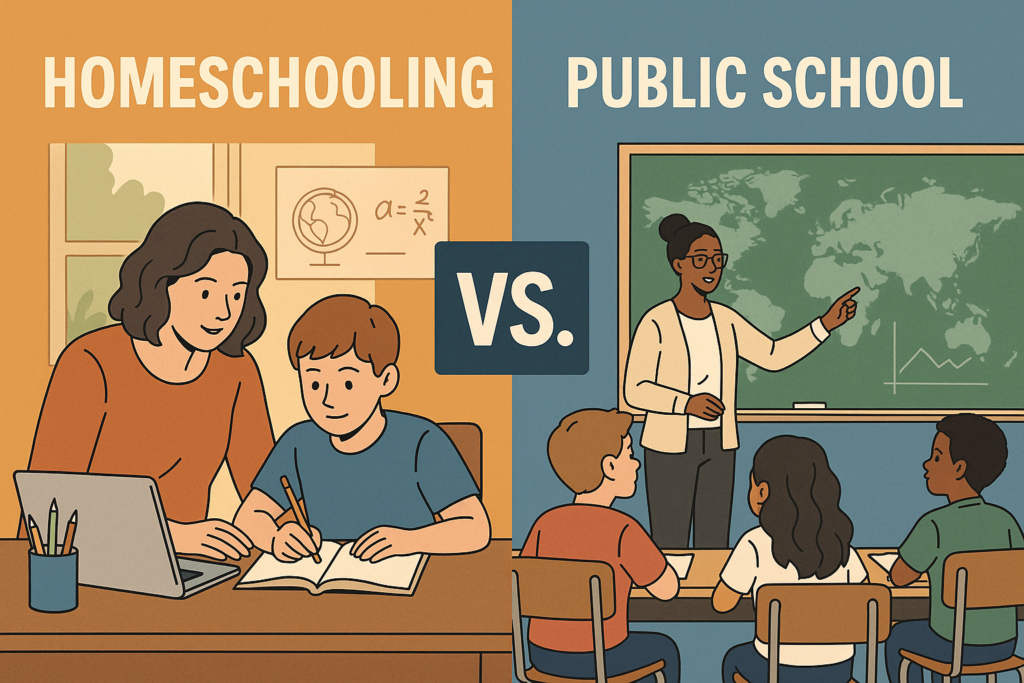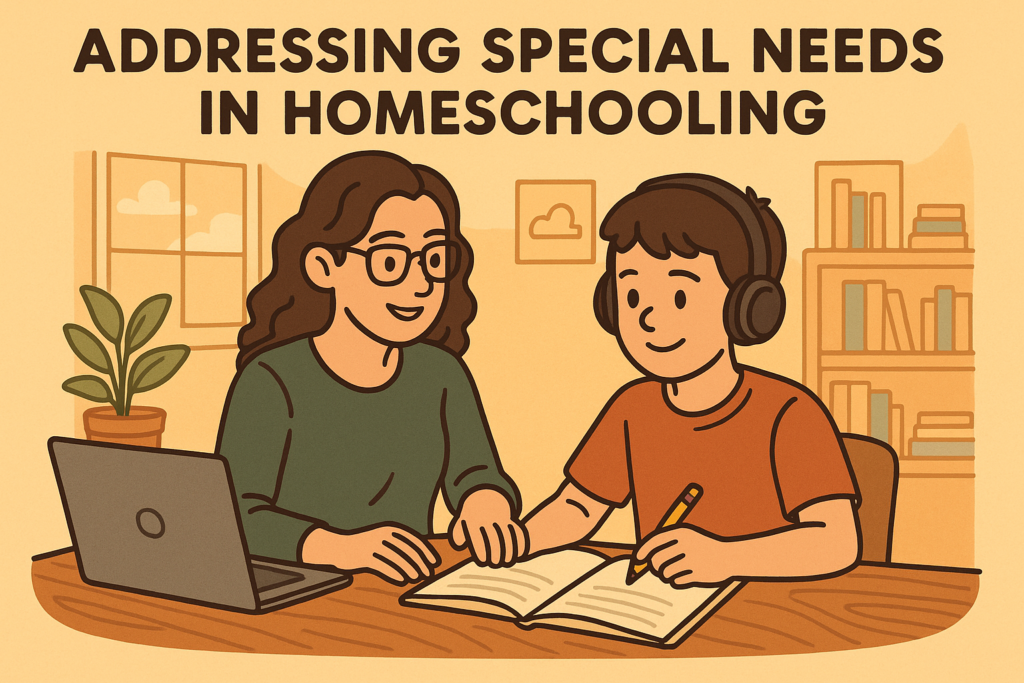Homeschooling vs. Public School: A Parent’s Guide to Decision-Making
Introduction: Embracing the Homeschooling Journey
In recent years, the educational landscape in the USA has witnessed a significant shift, with more families exploring online homeschooling programs as a viable alternative to traditional public schooling. Whether it’s the desire for a tailored curriculum, concerns about school safety, or the flexibility that homeschooling offers, parents are increasingly considering this path for their children’s education.
Understanding Online Homeschooling Programs
What Are Online Homeschooling Programs?
Online homeschooling programs are structured educational courses delivered via the internet, allowing students to learn from home. These programs can be fully online or blended, combining online and offline activities. They cater to various educational philosophies and learning styles, providing flexibility and customization.
Benefits of Online Homeschooling
- Flexibility: Students can learn at their own pace and schedule.
- Customized Learning: Curricula can be tailored to a child’s strengths and interests.
- Safe Learning Environment: Learning from home can mitigate concerns about bullying and school violence.
- Family Involvement: Parents can be more involved in their child’s education.
Homeschooling vs. Public School: A Comparative Analysis

Academic Achievement
Studies indicate that homeschooled students often outperform their public school counterparts on standardized tests. According to the National Home Education Research Institute, homeschooled students typically score 15 to 25 percentile points above public-school students on standardized academic achievement tests. (NHERI)
Socialization
A common concern is that homeschooling may limit social interaction. However, homeschooled students often engage in community activities, sports, and co-op classes, fostering social development. In contrast, public schools offer daily peer interaction but may expose students to bullying. Approximately 19.2% of students aged 12-18 reported being bullied in school during the 2021-2022 school year. (StopBullying.gov)
Cost Comparison
| Expense Category | Homeschooling (Annual per Student) | Public School (Annual per Student) |
|---|---|---|
| Curriculum & Materials | $600 – $1,500 | Included in taxes |
| Extracurriculars | Varies | Varies |
| Total Estimated Cost | $600 – $1,500+ | ~$16,446 (taxpayer-funded) |
Homeschooling costs can vary widely based on curriculum choices and extracurricular activities.
Legal Requirements for Homeschooling in the USA
Homeschooling is legal in all 50 states, but regulations vary. Requirements may include submitting a notice of intent, maintaining attendance records, and periodic assessments. For state-specific laws, resources like the Home School Legal Defense Association (HSLDA) provide detailed information. (Homeschool.com)
Curriculum Options for Online Homeschooling
Types of Curricula
- Traditional: Structured programs resembling public school curricula.
- Classical: Focuses on the trivium—grammar, logic, and rhetoric.
- Montessori: Child-centered learning with hands-on activities.
- Unschooling: Learner-led education based on interests.
Popular Online Programs
- Time4Learning: Offers interactive lessons for PreK-12.
- K12: Provides state-certified programs with teacher support.
- YVU: Yahweh Virtual University, bible based learning.
- Abeka: Christian-based curriculum with video lessons.
Preparing for College as a Homeschooled Student
Homeschooled students are increasingly being accepted into colleges and universities. Key steps include:
- Maintaining Transcripts: Keep detailed records of courses, grades, and extracurriculars.
- Standardized Testing: Taking SAT or ACT exams to meet college admission requirements.
- Dual Enrollment: Enrolling in college courses during high school years to earn credits. (TheHomeSchoolMom, Homeschool.com)
Addressing Special Needs in Homeschooling

Homeschooling allows for individualized education plans tailored to a child’s specific needs. Parents can adjust teaching methods and pace, incorporate therapies, and choose appropriate curricula. This flexibility can be particularly beneficial for students with ADHD, dyslexia, or other learning differences.
FAQs: Homeschooling Insights
Q: Do homeschooled students perform better academically than public school students?
A: Yes, studies show that homeschooled students often score 15–30 percentile points higher on standardized tests.
Q: How does socialization differ between homeschooled and public-school students?
A: Homeschooled students engage in various community activities, while public school students have daily peer interactions.
Q: Is homeschooling more time-consuming for parents compared to public school?
A: Homeschooling requires significant parental involvement but offers flexible scheduling.
Q: What are the financial costs of homeschooling vs. public school?
A: Homeschooling costs range from $600–$1,500+ per student annually, while public schools spend approximately $16,446 per pupil, funded by taxpayers.
Q: Are homeschoolers required to follow state educational standards?
A: Yes, but requirements vary by state. Most states require some form of academic progress assessment.
Q: Can homeschooled students transition back to public school easily?
A: Yes, but placement may involve assessments or review of prior records.
Q: Do homeschooled students lack access to extracurricular activities?
A: Not necessarily. Many participate in co-ops, sports, and community programs.
Q: How do homeschooling and public-school approaches differ for special needs students?
A: Homeschooling offers individualized pacing and resources, while public schools have specialized programs but may have larger class sizes.
Q: Do parents need teaching certifications to homeschool?
A: No state requires certifications, and parental education level does not significantly impact homeschool success.
Q: Are homeschooled students accepted into colleges?
A: Yes, colleges increasingly recruit homeschoolers, who often perform well on standardized tests and in college.
Conclusion: Is Online Homeschooling Right for Your Family?
Choosing between homeschooling and public schooling is a significant decision that depends on various factors, including your child’s learning style, family dynamics, and educational goals. Online homeschooling programs offer flexibility, personalized learning, and a safe environment, making them an appealing option for many families. By understanding the legal requirements, curriculum options, and potential challenges, you can make an informed decision that best supports your child’s educational journey.
Ready to explore online homeschooling programs? Start by trying YVU’s (Yahweh Virtual University) Free Bible Fun class every Saturday!
